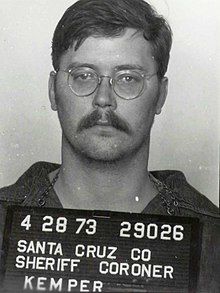Child Development
The Twisted Tale of "The Co-ed Killer"
The diabolical Ed Kemper
Posted March 17, 2014 Reviewed by Lybi Ma

The popular Netflix series Mindhunter has generated renewed interest in Edmund Kemper III. Exactly who is Ed Kemper?
He is a psychopathic serial killer and necrophile who was born on December 18, 1948, in Burbank, California. He became known as “The Co-ed Killer” after murdering six female students. Along the way, he also killed his own mother and her mother’s best friend. He was arrested in April of 1973 at the age of 24. Since then, he has been incarcerated at the California Medical Facility.
Despite his relative youth upon capture, Kemper had actually committed his first two murders nearly a decade earlier. Kemper was an extremely intelligent child but he engaged in psychopathic behavior early on. For Kemper, this behavior included the torture and killing of animals, which is a common childhood practice among nearly half of all serial killers.
During childhood, Kemper was physically and emotionally abused by his alcoholic mother, Clarnell, who was divorced from his father. Clarnell frequently locked her son in a dark basement alone at night.
Not surprisingly, Edmund grew up to hate his mother and at the age of 14 ran away from home in search of his father in Van Nuys, California. After locating but being rejected by his father, young Edmund was sent to live with his paternal grandmother and grandfather in North Fork, California. Kemper claims that his grandmother, similar to his mother, was very abusive and he disliked her intensely.
In 1964, at the age of 15, Edmund shot his grandmother in the head allegedly just to see what it felt like. He then killed his grandfather, too, because he believed that his grandfather would be angry at him for killing his grandmother. Kemper was subsequently committed to the Atascadero State Hospital for the criminally insane. To his chagrin, he was released into his mother’s care in 1969 after less than five years of confinement and treatment. His juvenile criminal record was expunged.
As a young adult, Kemper stood six-foot-nine and weighed 280 pounds. He frequently thought about killing his mother by 1970 but was not yet ready to do so. The prospect of killing his mother without first perfecting his murder skills on others was too overwhelming for Kemper.
Between May 1972 and February 1973, Kemper embarked on a series of six shocking serial murders in which he picked up hitchhiking female students along the highway and then transported them to rural areas where he would kill and then decapitate them, and have sex with their corpses. He collected their dismembered heads in his apartment and would later have sex with them also.
Similar to other infamous serial killers such as Dennis Rader, David Berkowitz and the Zodiac Killer, Ed Kemper sought public recognition and acclaim for his murders. This led him to socialize and drink in a bar called “The Jury Room” with the very law enforcement officers who unbeknownst to them were pursuing him. His law enforcement friends began calling him “Big Eddie.”
Kemper finally realized his ultimate fantasy and killed his mother with a claw hammer and strangled her best friend on Good Friday 1973. After having sex with his mother’s decapitated head, Edmund Kemper casually telephoned the local law enforcement authorities to confess what he had done.
The police initially refused to believe him, thinking that their friend “Big Eddie” was just pulling a prank on them. After several follow-up calls and the disclosure of information that only the “The Co-ed Killer” would know, Kemper finally convinced the police that he was the man they sought. He was quickly arrested without incident and charged with eight murders in the first degree. Kemper was found guilty and given a life sentence because there was a stay on the death penalty in the U.S. at the time of his conviction.
Given Kemper's homicidal obsession with his mother, one might wonder whether killing her exorcised the demons that had tormented him throughout his life and finally provided him with a twisted sense of closure. In the end, the answer to this question is simultaneously chilling and fascinating.
Kemper was asked by a Cosmopolitan magazine reporter during a prison interview how he felt when he saw a pretty girl after killing his mother. He said, “One side of me says, I’d like to talk to her, date her. The other side says, "I wonder how her head would look on a stick.”
The inglorious atrocities of Kemper demonstrate just how loathsome the actions of a serial killer can be. Although the abuse he suffered during childhood was tragic and terrible, and while it offers some insights into his criminal pathology, Kemper’s odyssey of murder, dismemberment, and sexual perversion still defies comprehension.
No hyperbole is required for his crimes to shock and horrify the public, yet the facts of Kemper’s murders are often misrepresented or exaggerated in their retelling by the entertainment media. There are numerous books, films, puzzles, poems, calendars, and games that hyperbolize his story of murder and mayhem.
For example, he was portrayed as a demonic freak in a slash and gore book titled The Lonely Head-Hunter: Ed Kemper and he has appeared as a supernatural monster in comic books. There is a Kemper gothic horror necklace and locket for sale on the Internet. The 2008 horror film Kemper: The Co-Ed Killer is almost entirely devoid of facts.
As a result of his inaccurate and sensationalized depiction in the entertainment media, Kemper has been transformed into a cartoonish monster in the popular culture—similar to Freddy Krueger in A Nightmare on Elm Street.
To its credit, the series Mindhunter gives a far more accurate portrayal of Kemper.
Dr. Scott Bonn is a criminologist, best-selling author, professor and media expert. Follow him @DocBonn on Twitter and visit his website at docbonn.com




